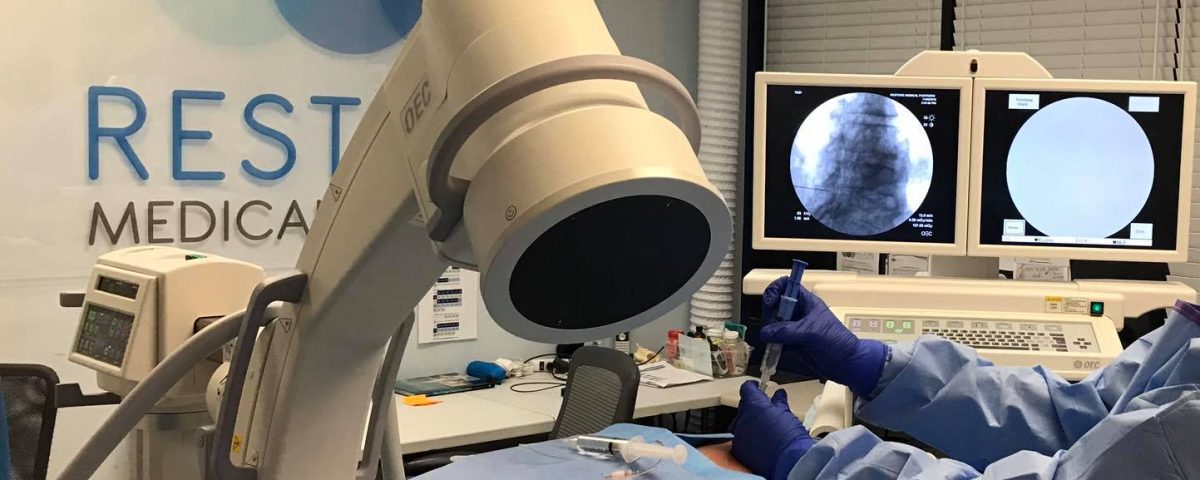
Effective Coping Strategies for Stress and Chronic Pain: Understanding the Link
July 18, 2023Herald Tribune Readers’ Choice Awards 2023 Finalist
August 9, 2023Exploring Interventional Pain Management: Injections, Nerve Blocks, and More

Pain is a universal human experience, and when it becomes chronic, it can significantly impact a person’s quality of life. In such cases, interventional pain management techniques can provide much-needed relief. This article delves into interventional pain management, focusing on injections, nerve blocks, and other effective treatments. We will explore how these procedures work, their benefits, and their role in managing various types of pain.
Understanding Interventional Pain Management
Interventional pain management involves minimally invasive procedures to diagnose and treat chronic pain conditions. These techniques directly target the source of pain, aiming to alleviate discomfort and improve functionality. Unlike traditional pain management methods that rely solely on medications, interventional approaches provide targeted relief, potentially reducing the need for long-term medication use.
Types of Interventional Pain Management Procedures
Injections
Injections are commonly used in interventional pain management to deliver medications or substances directly to the affected area. There are several types of injections, each serving a specific purpose:
Epidural Steroid Injections (ESIs): These injections deliver corticosteroids and local anesthetics into the epidural space surrounding the spinal cord. ESIs can relieve herniated discs, spinal stenosis, and sciatica.
Facet Joint Injections: Facet joints are small joints located between the vertebrae. Injections into these joints can help diagnose and treat pain caused by arthritis or injury.
Trigger Point Injections: Trigger points are tight knots in the muscles that can cause localized pain. Trigger point injections involve the administration of an anesthetic or saline solution into these areas to relieve muscle tension and pain.
Nerve Blocks
Nerve blocks are procedures that involve the injection of anesthetic medications near specific nerves to block pain signals. These blocks can provide temporary relief or be used as diagnostic tools to determine the exact source of pain. Some commonly performed nerve blocks include:
Peripheral Nerve Blocks: These blocks target nerves outside the spinal cord, such as those in the limbs. They can help manage pain associated with neuropathy, complex regional pain syndrome (CRPS), or nerve entrapment syndromes.
Sympathetic Nerve Blocks: Sympathetic nerves control involuntary bodily functions. Sympathetic nerve blocks can help alleviate pain caused by sympathetic-mediated pain, like complex regional pain syndrome or causalgia.
Radiofrequency Ablation
Radiofrequency ablation (RFA) is a minimally invasive procedure that uses radiofrequency energy to create heat and destroy specific nerves responsible for transmitting pain signals. RFA is often employed for longer-lasting relief and can effectively manage pain from arthritis or chronic back pain.
Benefits of Interventional Pain Management
Interventional pain management techniques offer several advantages for individuals suffering from chronic pain:
Targeted Relief: These procedures directly target the source of pain, providing more focused relief than oral medications that may affect the entire body.
Reduced Dependence on Medications: By addressing the underlying cause of pain, interventional techniques may reduce the need for long-term medication use, potentially minimizing side effects and dependency.
Improved Functionality: Pain can significantly impair a person’s ability to perform daily activities. Interventional pain management can enhance functionality and promote a better quality of life.
Diagnostic Benefits: Some interventional procedures, such as nerve blocks, serve a dual purpose by helping doctors identify the precise source of pain and guiding further treatment decisions. Interventional pain management techniques, including injections, nerve blocks, and radiofrequency ablation, offer targeted relief and improved functionality for individuals suffering from chronic pain. By directly addressing the source of pain, these procedures can reduce the reliance on long-term medications and enhance overall well-being. Consultation with a qualified pain management specialist is crucial to determine the most suitable approach based on individual needs.
Interventional pain management procedures are generally safe when performed by trained professionals. However, like any medical procedure, there are potential risks and complications. It’s important to discuss the benefits and risks with your healthcare provider.
The duration of pain relief varies depending on the individual, the specific procedure performed, and the underlying condition. In some cases, the relief can last for several weeks or months.
Interventional pain management techniques are not suitable for everyone. Certain medical conditions, allergies, or contraindications may limit their use. A thorough evaluation by a qualified healthcare professional is necessary to determine suitability.
Some procedures require local anesthesia, while others involve sedation or general anesthesia. The type of anesthesia used depends on the procedure and individual factors.
While interventional pain management techniques can provide significant relief, eliminating chronic pain may not always be achievable. The goal is to manage and minimize pain to improve daily functioning and quality of life.



